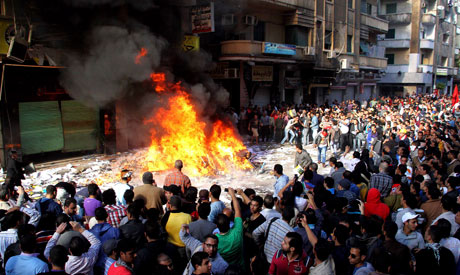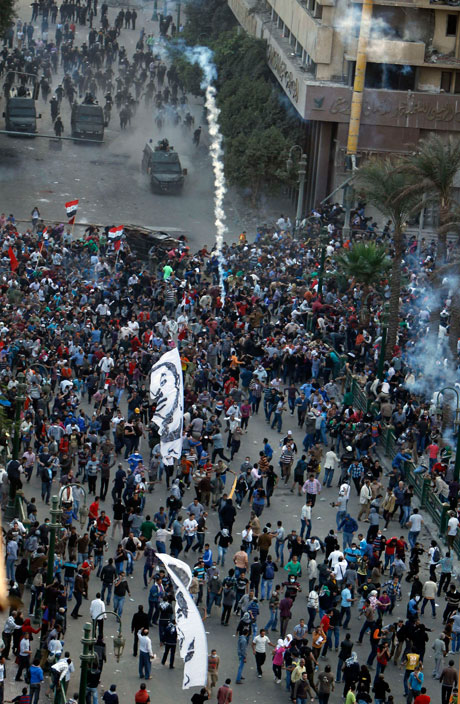
Items ransacked from the office of the Muslim Brotherhood's FJP are burned outside the building, while the crowd is watching. Under: teargas is hurled at protesters in Cairo. (Photos Reuters).
The Constitutional Declaration that the Egyptian president Mohammed Morsi issued on Thursday with the professed aim of 'protecting the revolution' has had a divisive effect and put two camps heatedly against each other in the streets of several Egyptian cities. One side defended Morsi's measures and , consisted mainly of members of the Muslim Brotherhood. The opposite side strongly attacked the president. These were in fact all leftist, liberals en and non-islamist factions that took part in the 25 January uprising. Both sides have been clashing with each other and with the security forces for two consecutive days, Friday and Saturday, and in several cities.
It was difficult to estimate how may people participated in the protests. But in Cairo it were some tens of thousands who took to the streets on Friday, with the opposition forces calling Morsi the 'New Farao' and chanting slogans in which they demanded his downfall.
Morsi's declaration consisted essentially of two parts. In one part he demanded a purification of government agencies from figures who were linked to the former regime. Also he announced that Mubarak and other important members of the former regime will get a retrial of their cases, together with new processes for all people that were involved in harming or killing protesters. He appointed a new Prosecutor General. All of these, in fact, met demands by opposition figures who had complained time and again that punishments had been too lenient and in many cases even absent (the many police officers that were acquitted in cases in which they had been indicted for murder of protesters, for instance) due to lousy work of the office of the former Prosecutor General, a leftover from the Mubarak-era, Abdel Meguid Mahmoud.
The other part of Morsi's declaration, however, was the part that was met with strong criticism. In it he declared that no decisions taken by him since he came to power could be challenged, legally or otherwise till after the adoption of a new Constitution and elections for a new Maglis as-shaab (lower house of parliament). Also he declared that the Shura Coucil (a kind of Senate) and the Constitutional Assembly that is writing a new Constitution, cannot be dissolved. The Assembly even got two more moths to do its work. It was these last two provisons that woke the anger of the leftist opposition. I must say that I under estimated the reaction in a country where the allergy for absolute power in the hands of one person is still much alive after 30 years of 'faraonic' reign by Mubarak. Also the provision that the Costitutional Assembly cannot be dissolved raised strong protests, as the Assembly itself is quite controversial, dominated as it is by Islamists. Several people have left the Assembly over the past weeks, among them leftists, liberals and Christians. A court judgement over the question whether its composition was legally corect or not, was expected just one of these days.
Law professors, opposition leaders like Amr Moussa, the Nasserist Hamdeen Sabbahi, or Muhammed Baradei said that Morsi with the new declaration gave himself more powers than any other president ever before him. The president himself tried to calm the criticism dwo with a conciliatory speech, in which he said that he did not deny the right of the opposition to criticize him, and that he only issued the declaration out of necessity. His spokesman said earlier that Morsi only came with the declaration in order to put a end to legal wrangling and maintain stability. The unrest did not die down however. Morsi's adviserory team of 17 (of which two members are reported te have resigned out of protest), would convene on Saturday to find a way out of the crisis. Meanwhile there were concerned reactions from the United States, the United Nations and the European Union.“We are very concerned about the possible huge ramifications of this declaration on human rights and the rule of law in Egypt,” UN Human Rights Commissioner Navi Pillay's spokesman told a press briefing at the UN in Geneva. It is ironic that Morsi caused this uproar just one day after he upgraded greatly his national ad international prestige with the achievement of a cease fire in Gaza between Israel and Hamas.



.jpg)


1 comment:
The shift we see now its mainly the Brotherhood (and partly the salafis) against the liberals including all the Mubarak supporters who did not take part in the revolution but voted for Shafiq. For the first time we feel afraid that things will go out of hand soon. One thing i dont understand is that nobody sees that Morsi had two choices last week: to leave or to become (hopefully temporarely) a dictator. It is interesting (and scary) to see how impatient frustrated and angry the people are. Used to blame the other instead of looking at themselves to start the progress and the process. Daniella, Cairo
Post a Comment